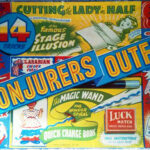The challenge I have as an academic is that I am both inside and outside of my research. I cannot avoid writing from the perspective of a long-term insider within the performance magic community. Even so, occasionally my writing demonstrates moments where my position sits broadly on the outside which is usually in peer-reviewed articles, or on the inside which is usually in the material written primarily for magicians.
In anthropological scholarship, McCutcheon (1999) asks an important question ;
‘ … whether, and to what extent, someone can study, understand, or explain the beliefs, words, or actions of another’
(McCutcheon, 1999p. 2).
I recognise that I can never truly separate myself from my work or regard magicians as (an)other and as such I think much of my research chimes broadly with McCutcheon’s notion of a ‘reflexive stance’ where
‘observations are inextricably entwined with the self-referential statements of the observer.’
(McCutcheon, 1999, p. 9)
We see the insider/outsider divide between performance magic and the academy discussed in Goto-Jones (2016) who argues that both sides have
‘developed separate bodies of knowledge about magic and separate systems of qualifications to recognise and grant access to them.’
(Goto-Jones, 2016, p. 35)
He argues that while the academy
‘recognises the expertise of magicians as performers, their status as “professors of magic” is usually ignored or viewed as a quaint quirk of an eccentric subculture; magicians are at best amateur scholars.’
(Goto-Jones, 2016, p. 35)
I share Goto-Jones’ hope that academic studies can help bridge the ‘ostensible divide’ (Goto-Jones, 2016, p. 36). Thus, while I may attempt to move between the worlds of the academy and performance magic in my work, I am very much in the ‘middle of the puzzle’, ‘circling words, making metaphors and meaning’ (McCutcheon, 1999, p. 10).
It is also worthwhile to note that while I did not begin my work as an ‘initially ignorant researcher’ as Graham M. Jones did in his study of performance magic (Jones, 2011, p. 28).1 I was already a performance magician and, a decade ago, I became deeply interested in bizarre magick and what this genre held for my own performance practice and this is where to date my primary research interests lie.
In his 2009 web article The Real Work: Modern Magic and the Meaning of Life, Adam Gopnik argues that
‘being a magician is membership in a subculture, where methods and myths can be appreciated only by initiates.’
(Gopnik, 2009)
It is within this sub-culture that training in magic occurs, this is the real work identified by Gopnik, and this training comes from others within the sub-culture. Gopnik concludes;
‘The real work is the complete activity, the accumulated practice, the total summing up of tradition and ideas.’
(Gopnik, 2009)
It is, I feel, next to impossible to write about such a niche performance genre as bizarre magick without being part of a sub-culture/community of bizarre magicians as much learning in this secretive art comes through sharing work, practice, and ideas.
1Some studies by outsiders are less successful, at least in the eyes of the magic community. As Genii Magazine’s damning review of Alex Stone’s book Fooling Houdini concluded: ‘Want to learn about magic? Read a book written by a real magician.’ (Swiss, 2012, p. 80) .
Gopnik, A. (2009). The Real Work: Modern Magic and the Meaning of Life. The New Yorker. http://www.newyorker.com/reporting/2008/03/17/080317fa_fact_gopnik?currentPage=all
Goto-Jones, C. (2016). Conjuring Asia: Magic, Orientalism, and the Making of the Modern World. Cambridge University Press.
McCutcheon, R. (1999). The Insider/Outsider Problem in the Study of Religion: A Reader. Bloomsbury Publishing Plc.
Swiss, J. I. (2012). Books—Review. Genii, 75(7), 80.

Comments by Nik Taylor